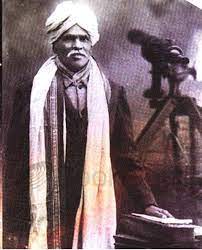An Eminent Indian Scientist and Thinker -
Venkatesh Bapuji Ketkar
We, Indians often forget the name of our very own
astronomer, who predicted the existence of Brahma: Pluto and dedicated his life
to do the research on almanac system of timekeeping - Shri. Venkatesh Bapuji
Ketkar.
The
family of Venkatesh Bapuji Ketkar was originally from a small village called
"Ketaki Bivali", near Chiplun, situated in the Konkan belt of
Maharashtra. This was the period when Sambhaji Maharaj was assassinated and the
Mughals had established their stronghold in Maharashtra. Due to the fights and
the Bhalerāī raids, Venkatesh Ketkar's ancestors settled in Paithan which was
known back then as the hub of education, moneylending and textile business. The
ancestral business of the Ketkar family was of the zari and textiles
work.
On
January 15th, 1815, Bapu Shashtri Ketkar (father of Venkatesh Bapuji Ketkar)
was born with great intelligence and at a very early age, he had mastered the
art of grammar and astronomy. Bapu Shashtri was also a music lover and migrated
to Thanjavur to study Rudraveena. Along with music he kept his love for
astronomy alive and wrote several research papers in this course.
On
2nd February 1884, there was a revelation, a multitalented personality was born
to Shri. Bapu Shastri Ketkar - Venkatesh Bapuji Ketkar. God revealed to us the
Indian astronomer and a revolutionized thinker of all times who shall always be
remembered and looked up to as an eminent Indian scientist who drastically
evolved the field of astronomy and Pañcānga (the research of Almanac and Hindu
calender).
At
the age of 16, Venkatesh Ketkar lost his father and he had to face dire
financial difficulties. He was studying English in a school called ‘Sardar’ in
Belgaum. He used to get a scholarship of three rupees per month. He had to
spend the night in someone else's verandah and saw a very dark and tough period
in his life where he was barely able to make both the ends meet.
Even though, he had these distractions all around him, he did not let that
overpower his studies and passed the matriculation examination in 1874 and
secured the third place. For this achievement, he was felicitated with the ‘Bai
Manik Bairamji Jijibhoy Award’. He was unable to carry forward his studies due
to financial conditions, but at the age of 21, he accepted the teaching
profession and serviced in a school of Bagalkot for 25 years. He retired from
this job in 1911 but the retirement was only from the job. He never retired
from actual research work and astronomy discoveries. A few of his important
research papers were 'Bhagavad Gita', 'Kalnirnay', 'Chronology of Aryans',
'Estimation of Shivaji Maharaj's Birth date', 'Āryabhata and Kuttaka
Mathematics'. He was a personality who was highly self-esteemed and full of determination
even after ups and down. He was highly assertive with a sense of pride. He was
always adamant about his own point of view and would convince all the others
about his thoughts. He used to write research books, but never ever in the
pages of life will we ever read that he asked for favours to get his books
published. He was a calm and serious leading light who was very straightforward
and fair witted. Ketkar's love for his subject, consistent thinking and
self-esteem were his undisputed qualities. He was a polyglot and was fluent in
many languages like English, French, Sanskrit and Hindi. He had a gift of
intense intelligence, and scientific approach. His mind was full of curiosity
about space and astronomy. Because of this interest he decided to study this
further and acquired knowledge in the fields of spherical geometry, algebraic
geometry, trigonometry statistics, other complex mathematics and the Newton's
‘Principia Mathematica’.
The
most significant discoveries of Venkatesh Bapuji Ketkar was the prediction
about the existence of Brahma (modern name Pluto) before its actual discovery.
The period of revolution of Brahma was 242 years as predicted by Venkatesh
Ketkar and after the discovery of Pluto, scientists have estimated the period
of revolution of Pluto as 247.7 years which is quite near to the prediction
made by him. Combining all of his hardwork, intelligence and love for
mathematics, he became an eminent personality not only in astronomy but in
Mathematics too. He was an avid reader and read sanskrit texts, scientific and
spiritual books and literature. He was also a renowned writer and wrote books
on almanac and literacy.
He had a love for music, drawing maps and sketching. He was very fine at
sculpting and making Ganesh idols. In his free time, he used to repair watches. He adhered to the principles of moral duty taught by
his father and walked on his fingerprints his whole life.
He
used to wear a traditional attire of a white dhoti, a white shirt, a black
coat, a headgear, a scarf, spectacles and a tilak on his forehead. He lived a
simple, content, composed life with a high thinking and brilliance and was
highly respected among the society.
Venkatesh
Bapuji Ketkar worked tirelessly and diligently for 56 consecutive years,
turning his back to all worldly pleasures and was never fascinated by any
worldly attachments and materialistic objects. After struggling with dementia
and illness for a year, on Wednesday, July 30, he said to his son, "Look,
now only one, two and three." No one understood what he meant. After three
days, on Sunday, August 3, 1930, at 10.30 at night, Venkatesh Ketkar breathed
his last at Bijapur.
VB
Ketkar's mastery of astronomy was so irreplaceable, that his death had caused
irreparable damage to the Aryan Astronomy. I feel that it is our duty to
disperse the work and life story of Venkatesh Bapuji Ketkar, the greatest thinker
of all the times.


Comments
Post a Comment